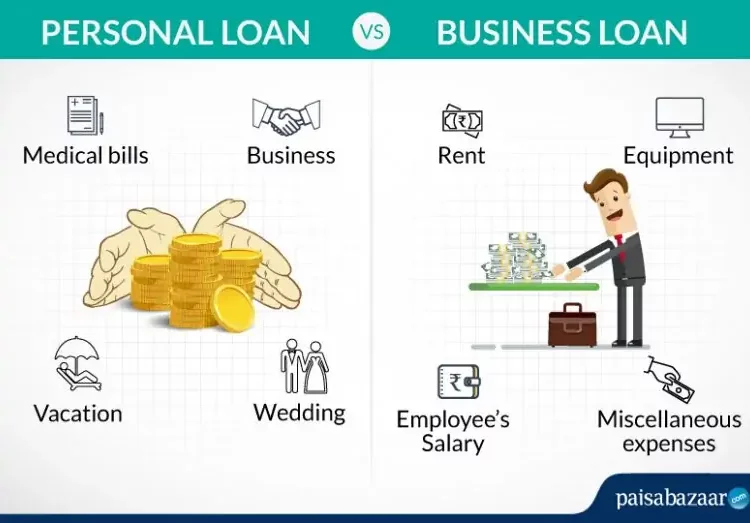Starting a small business is an exciting journey, but it also comes with its fair share of challenges. One of the biggest hurdles that small businesses face is securing financing to cover start-up costs and ongoing operational expenses. While there are various options available for obtaining funding, such as crowdfunding or venture capital, one of the most common and traditional ways to secure financial support for your business is by getting a business loan.
Toc
However, qualifying for a business loan can be challenging, especially for first-time entrepreneurs or those with less-than-perfect credit. In this guide, we will discuss some tips on how you can increase your chances of qualifying for a business loan and securing the funds you need to make your dream of owning a successful small business a reality.
Understanding Business Loans

Before we dive into the tips on how to qualify for a business loan, let’s take a moment to understand what exactly a business loan is. A business loan is a sum of money borrowed from a lender, usually with an interest rate attached, that is intended for business purposes. This could include funding for start-up costs, purchasing inventory or equipment, covering operational expenses, or expanding your business. Business loans can come from a variety of sources, including banks, credit unions, online lenders, or even government programs.
What is Business Loans Used For?
Business loans can be used for a variety of purposes, depending on the needs and goals of your business. Some common uses for business loans include:
- Start-up costs: When starting a new business, there are various initial expenses that need to be covered, such as purchasing equipment, office space, or inventory. A business loan can help you cover these costs and get your business up and running.
- Working capital: This refers to the funds needed for day-to-day operations of your business, such as paying employees, buying supplies, or covering rent. A business loan can provide the necessary working capital to keep your business running smoothly.
- Expansion: If you’re looking to grow your existing business, a business loan can be used to finance expansion efforts such as opening a new location or launching a new product line.
- Debt consolidation: If your business has multiple outstanding debts with high-interest rates, you can use a business loan to consolidate these debts into one manageable monthly payment with a lower interest rate.
Types of business loans available
- Term Loans: These are traditional loans with fixed repayment terms, typically ranging from one to five years. Borrowers receive a lump sum upfront, which they repay with interest over the agreed period. Term loans are often used for significant expenditures, such as purchasing equipment or real estate.
- SBA Loans: Backed by the Small Business Administration, these loans offer favorable terms and lower interest rates compared to conventional loans. They are designed to support small businesses that may not qualify for standard loans due to credit issues or lack of collateral.
- Lines of Credit: This type of financing provides businesses with access to a set amount of funds that they can draw from as needed, similar to a credit card. Interest is only paid on amounts used, making it a flexible option for managing cash flow and covering unexpected expenses.
- Invoice Financing: This method allows businesses to borrow money against their outstanding invoices. By selling unpaid invoices to a lender, small businesses can quickly access cash while waiting for their customers to pay.
- Merchant Cash Advances: This option provides a lump sum in exchange for a portion of future credit card sales. While this can be a quick solution for funding, it’s essential to note that repayment terms can be costly, making it vital to carefully assess this option.
By understanding the different types of business loans available, you can make informed decisions about which option may be best suited to your needs and increase your chances of qualifying for the financing necessary to grow your small business.
Tips for Qualifying for a Business Loan

Now that we have a better understanding of business loans let’s explore some tips on how to increase your chances of qualifying for one.
1. Prepare a Solid Business Plan
A well-crafted business plan is crucial when applying for a business loan. It shows lenders that you have thoroughly researched and planned your business, understand the industry, and have clear goals and strategies in place. A comprehensive business plan should include details such as:
- Executive Summary: A brief overview of your company, including its mission statement, products or services offered, target market, competition analysis, and financial projections.
- Company Description: This section provides more detailed information about your business, including its legal structure, location, and history.
- Market Analysis: This section should demonstrate that you have thoroughly researched your industry and target market, including customer demographics, competitors, and any potential challenges or opportunities.
- Products and Services: Outline what products or services your business offers and how they meet a need in the market.
- Marketing and Sales Strategy: Detail how you plan to reach and attract customers and generate sales.
- Management Team: Introduce key members of your management team and their roles within the company.
- Financial Projections: Provide realistic estimates of income statements, balance sheets, cash flow projections for at least three years.
Having a solid business plan not only makes your application more appealing to lenders, but it also serves as a roadmap for your business’s success.
2. Build Your Credit Score
Having a good credit score is essential when it comes to qualifying for a business loan. Lenders use this as an indicator of your business’s ability to repay their loan. To build and maintain a strong credit score, make sure you pay all bills on time, keep your credit card balances low, and avoid opening too many new lines of credit.
If you have no credit history or a poor credit score, consider applying for a secured credit card or small loans specifically designed to help borrowers establish or rebuild their credit.
3. Gather Necessary Documents
Lenders will ask for various documents when evaluating your business loan application. These may include:
- Personal and Business Tax Returns
- Financial Statements (balance sheet, income statement, cash flow statement)
- Bank Statements
- Legal Documents (business licenses, contracts, leases)
Make sure to have these documents organized and readily available to speed up the application process.
- https://smartlearnnetwork.com/the-impact-of-business-loans-on-your-companys-financial-health/
- https://smartlearnnetwork.com/business-loans-vs-personal-loans-for-entrepreneurs-which-is-right-for-you/
- https://smartlearnnetwork.com/how-to-use-business-loans-for-maximum-growth-and-profitability/
- https://smartlearnnetwork.com/understanding-personal-loans-a-comprehensive-guide/
4. Consider Collateral Options
Collateral refers to assets that a borrower pledges as security for a loan. It gives lenders assurance that they can recover some of their money in case the borrower is unable to repay the loan. Collateral can take many forms, including real estate, equipment, inventory or accounts receivable. Having collateral can increase your chances of qualifying for a business loan and may also result in lower interest rates.
However, not all lenders require collateral for every type of financing. For instance, SBA loans typically require collateral only for loans above $25,000. If you’re unable to provide collateral or prefer not to risk any assets, consider exploring other options such as unsecured lines of credit or invoice financing.
5. Research Lenders
Not all lenders offer the same types of business loans or have the same criteria for approval. Before submitting an application, take time to research different lenders and their requirements to find one that aligns with your needs and qualifications. Consider factors such as interest rates, repayment terms, fees, and customer reviews to make an informed decision.
By following these tips, you can increase your chances of qualifying for a business loan and secure the financing necessary to support your small business’s growth. Remember to carefully assess your options and select the one that best suits your needs and financial situation. With proper planning and preparation, you can set your business up for success with the right financing. So, always remain proactive and stay updated with the latest trends in business financing to make informed decisions when it comes to managing your cash flow and covering unexpected expenses.
Step to Qualify for a Business Loan

1. Prepare Financial Statements
Having accurate and up-to-date financial statements is critical when applying for a business loan. Lenders want to see clear evidence of your business’s financial health.
- Income Statements: These documents should demonstrate your business’s profitability over time. Make sure to include revenue, expenses, and net income. Highlight trends that show growth and stability.
- Balance Sheets: This statement offers a snapshot of your business’s assets, liabilities, and equity. A strong balance sheet can indicate financial strength and reliability to potential lenders.
- Cash Flow Statements: Showcasing your cash flow is vital. Lenders need to see how well you manage cash inflows and outflows, demonstrating your ability to repay the loan. Be sure to highlight consistent positive cash flow.
2. Build Credit:
Your creditworthiness plays a significant role in determining loan eligibility.
- Business Credit Score: Maintaining a good business credit score is essential. Ensure you pay your bills on time and manage your debts effectively. Consider using a business credit card for purchases, which can help build your score over time.
- Personal Credit Score: Lenders often assess your personal credit score, especially for small businesses. Make sure your personal finances are in order, as a strong credit history can enhance your business’s credibility.
3. Create a Solid Business Plan:
A well-thought-out business plan is not only a roadmap for your business but also a key document for securing a loan.
- Detailed Plan: Your business plan should include an in-depth market analysis, financial projections, and strategies for growth. Lenders want to see how you plan to use the loan and how it will contribute to your business’s success.
- Clear Purpose: Clearly define how the loan will be utilized. Whether for purchasing equipment, hiring staff, or expanding your product line, a specific purpose can make your application more compelling.
4. Gather Documentation:
Having the right documentation ready can streamline the application process.
- Legal Documents: Ensure you have all necessary legal documents, including business licenses, tax returns, and ownership agreements. These documents prove your business’s legitimacy and compliance with regulations.
- Collateral Information: If applying for a secured loan, provide detailed information about any assets you’re willing to put up as collateral. This can include real estate, equipment, or inventory. Transparency about your collateral can enhance your loan application.
5. Understand Loan Options:
Familiarize yourself with different types of loans available to small businesses.
- Traditional Bank Loans: These typically offer lower interest rates but have stricter qualification criteria. Understanding your bank’s requirements can help you prepare effectively.
- SBA Loans: The U.S. Small Business Administration (SBA) provides government-backed loans that can be easier to qualify for, though they often require a lengthy application process.
- Alternative Lenders: Online lenders and peer-to-peer lenders may offer faster funding with more flexible requirements, though interest rates can be higher. Research your options to find the best fit for your business needs.
6. Build Relationships with Lenders:
Establishing strong relationships with potential lenders can be beneficial.
- Networking: Attend local business events and connect with financial institutions. Building rapport can provide insights into what lenders are looking for and make your application stand out.
- Seek Advice: Don’t hesitate to ask for advice from professionals, such as financial advisors or accountants, who can guide you on improving your financial position and presentation.
Conclusion

Securing a business loan can be a crucial step in driving your small business toward growth and success. By taking proactive measures to prepare your financial documents, building your credit, and crafting a solid business plan, you not only enhance your chances of approval but also set a strong foundation for your business’s financial health. Remember, the loan application process can be complex and competitive, but it’s important to stay organised and informed about your options. As you navigate this journey, keep in mind the importance of maintaining relationships with lenders, seeking guidance when needed, and staying updated on the latest in business financing trends. With careful planning and a strategic approach, you can unlock the necessary resources to propel your business forward and achieve your goals.











